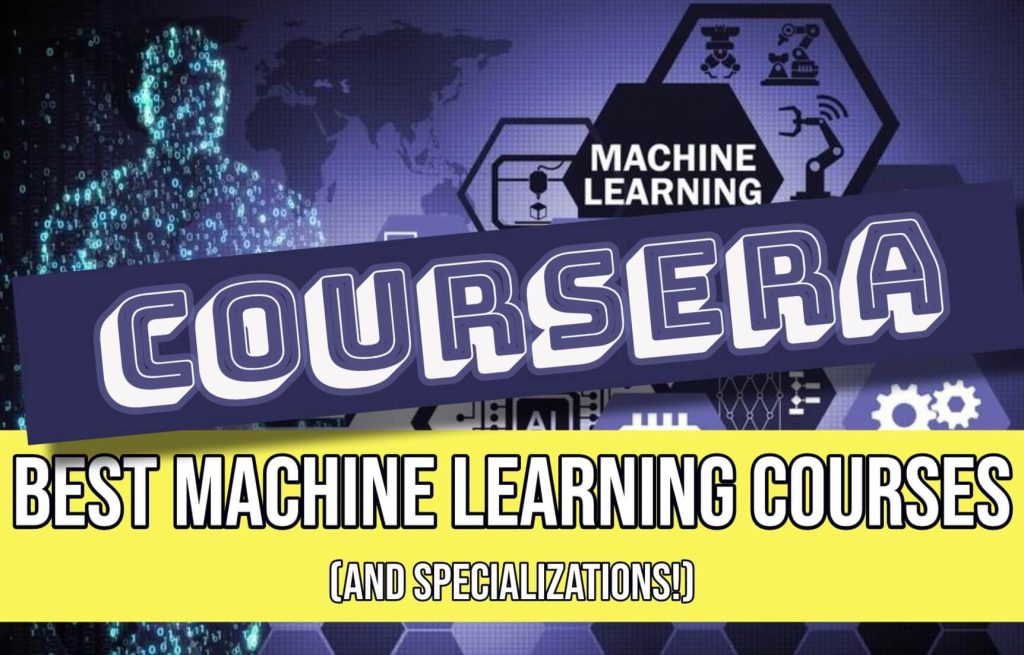Table of Contents
Today we’re looking at the best Coursera machine learning courses we could find.
In this post, you’ll discover their:
- main topics
- layout
- estimated completion times
- price
And much more.
🧠 Did you know? According to Findly, Netflix saved $1 billion from a machine learning algorithm that personalizes recommendations for users.
What is machine learning?
Machine learning is a part of artificial intelligence where a machine has the ability to imitate human behavior. This includes:
✅ image recognition
✅ natural language processing (NLP)
✅ performing physical actions
And beyond.
The idea is that a computer can learn and adapt without humans.
Where is machine learning used?
Machine learning is used in a variety of ways including:
- speech recognition
- email filtering
- banking software
- medical diagnosis
And beyond.
This post contains affiliate links. I may receive compensation if you buy something. Read my disclosure for more details.
TLDR: Best Coursera Machine Learning Courses and Specializations
📌 Beginner
✅ Machine Learning for All
✅ Mathematics for Machine Learning Specialization
📌 Advanced Beginner
✅ Machine Learning with Andrew Ng
📌 Intermediate
✅ Machine Learning with Python
✅ Machine Learning Specialization
Coursera offers dozens of machine learning courses and Specializations.
Let’s dive into our favorites, grouped by skill level: beginner, advanced beginner, and intermediate.
Coursera Machine Learning Courses and Specialization for Beginners
First let’s explore some beginner courses and Specializations (a Specialization on Coursera is a combination of courses in a specific discipline).
1. Machine Learning for All
⚠️ Level: Beginner
👨🏫 Modules: 4
📂 Projects: 1
📚 Learning style: Video
⏲️ Estimated completion time: 21 hours
⌨️ Embedded code editor: Yes
Machine Learning for All is unique in that there is no programming in this course.
So it’s great for newbies.

➡️ In our opinion, Machine Learning for All is one of the best Coursera machine learning courses for students with no prior programming experience.
You’ll start by learning the basics on how machine learning technologies work.
In addition, you’ll learn about the ethical dangers of machine learning.
Course Layout
Using a series of videos, readings and quizzes, you’ll learn about machine learning.
Machine Learning for All covers 3 key concepts:
✅ Machine Learning – learn about artificial intelligence and machine learning techniques
✅ Data Features – learn how data representation affects machine learning
✅ Machine Learning in Progress – learn how to test machine learning projects
Then you’ll work on your machine learning project.
Projects
In this Coursera machine learning course final project, you’ll collect a dataset, train a model and test it.
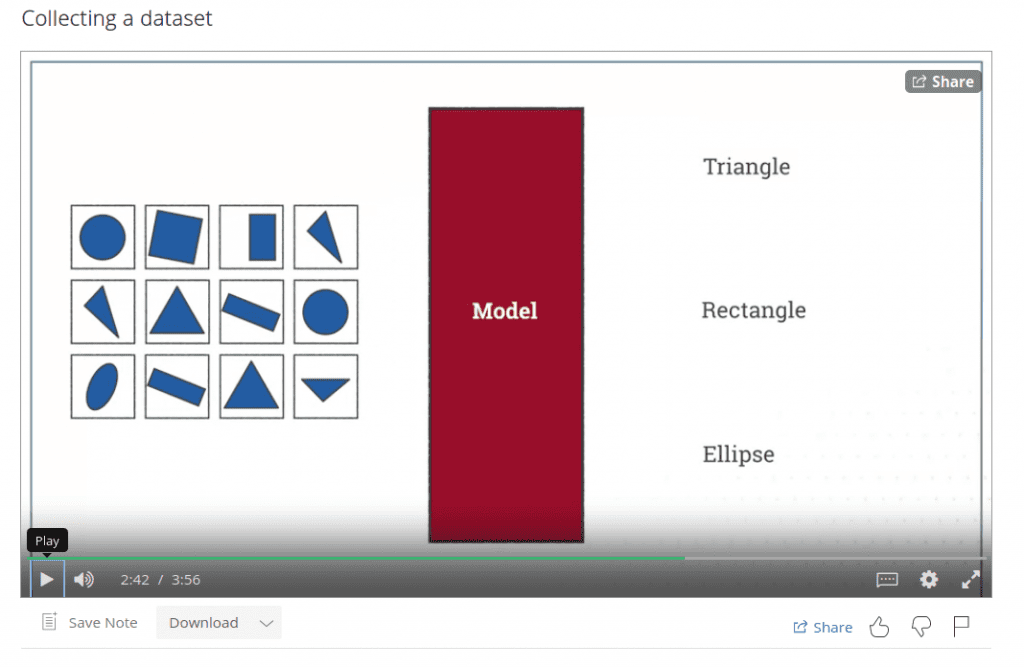
Takeaway
Because you don’t need any programming experience, Machine Learning for All is a fantastic way to enter the world of machine learning.
2. Mathematics for Machine Learning Specialization
⚠️ Level: Beginner
👨🏫 Courses: 3
📂 Projects: Mini projects
📚 Learning style: Video
⏲️ Estimated completion time: 4 months
⌨️ Embedded code editor: Yes
Falling behind in math is a recipe for failure in machine learning.
Luckily, Mathematics for Machine Learning is a little different from the other Coursera courses and Specializations we feature here.

➡️ Machine Learning Specialization is arguably one of the best Coursera machine learning courses for students who generally aren’t good at math.
This Specialization covers nothing but prerequisite math for apps in data science and machine learning.
Specialization Layout
There are 3 courses in this machine learning Specialization:
✅ Mathematics for Machine Learning: Linear Algebra – learn how linear algebra relates to vectors and matrices, implement ideas in code
✅ Mathematics for Machine Learning: Multivariate Calculus – learn how to calculate vectors and build approximations for functions
✅ Mathematics for Machine Learning: PCA – learn how to derive Principal Component Analysis (PCA)
Projects
You’ll work on mini projects with Python throughout Mathematics for Machine Learning.
Takeaway
If math is not your strong suit, we highly recommend you consider this course.
With its beginner and intermediate modules, you’ll work directly with math that you’ll be using throughout your machine learning career.
Coursera Machine Learning Course for Advanced Beginners
Now let’s take a peek at these Coursera machine learning courses for advanced beginners.
3. Machine Learning by Andrew Ng
⚠️ Level: Advanced Beginner
👨🏫 Modules: 11
📂 Projects: See below
📚 Learning style: Video
⏲️ Estimated completion time: 60 hours
⌨️ Embedded code editor: Yes
Ok, so we’ve all heard of this Andrew Ng Coursera course. It’s famous!
But what makes it so great?

Andrew Ng is a fantastic instructor.
And Machine Learning has over 3.7 million students to show for it.
Andrew will walk you through the absolute basics and best practices in machine learning all the way up to database mining and applying algorithms.
➡️ We think Machine Learning is one of the best Coursera machine learning courses for advanced beginners.
Machine Learning is listed as Beginner on Coursera. But because it’s math-heavy and covers concepts in depth, we decided to categorize it as Advanced Beginner.
Course Layout
Similar to other Coursera machine learning courses, you’ll learn concepts with videos, articles and interactive quizzes.
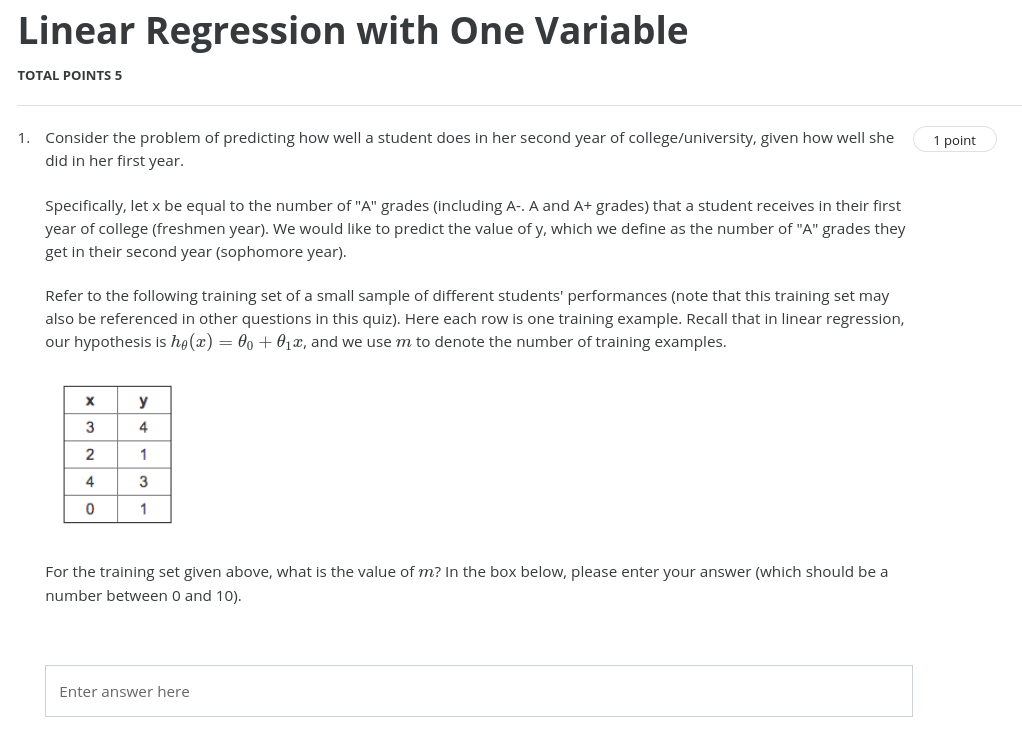
Machine Learning contains 11 modules including:
✅ Linear Regression – one and multiple variables best practices and implementation
✅ Neural Networks – representation and learning parameters using the backpropagation algorithm
✅ Unsupervised Learning – learn about the k-Means algorithm for clustering
✅ Large Scale Machine Learning – apply machine learning algorithms with large datasets
And more.
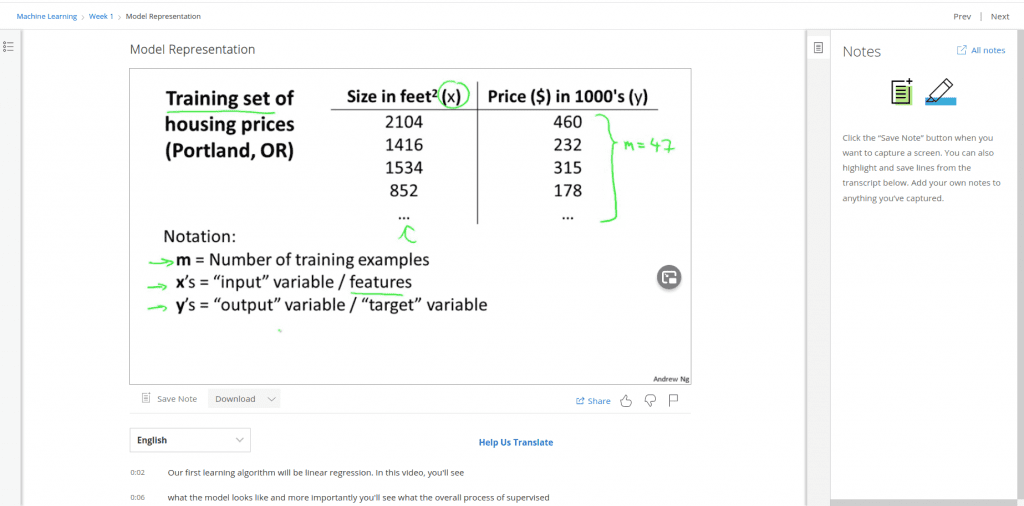
In addition, you’ll gain valuable insight into applying machine learning techniques.
🔥 Geena’s Hot Take:
Machine Learning is the machine learning course to take on Coursera. It’s thorough and concepts are expertly explained.
According to countless students, an Andrew Ng education can’t be beat!
Projects
You’ll work on mini projects throughout the modules in the course.
Takeaway
By the end of this course, you’ll gain skills in machine learning, logistic regression, algorithms and more.
Coursera Machine Learning Course and Specialization for Intermediate Students
Let’s dive into these Coursera machine learning courses for intermediate learners.
4. Machine Learning with Python
⚠️ Level: Intermediate
👨🏫 Modules: 6
📂 Projects: 1
📚 Learning style: Video
⏲️ Estimated completion time: 22 hours
⌨️ Embedded code editor: Yes
Machine Learning with Python has two key takeaways:
1️⃣ Learn how machine learning applies to the real world
2️⃣ Get an overview of supervised vs unsupervised learning, model evaluation and algorithms
➡️ We believe Machine Learning with Python is one of the best Coursera machine learning courses for experienced Python developers.
You’ll learn intermediate Python concepts as they apply to machine learning.
Course Layout
As with all courses, you’ll watch a series of videos, read, and take interactive quizzes.
5 modules cover:
✅ Introduction to Machine Learning – learn about machine learning applications in various career fields
✅ Regression – learn about regression types and their applications
✅ Classification – learn about classification technique using different classification algorithms
✅ Clustering – learn how to use clustering for segmentation and grouping
✅ Recommender Systems – learn about recommendation engine types
And then you’ll work on a final project.
Projects
There’s one project which combines all concepts you’ve learned in the course. And it’s fun because you’ll submit a report of your project for a peer evaluation.
Takeaway
Because you’re working with real-world scenarios, Machine Learning with Python makes more sense than practicing concepts without context.
5. Machine Learning Specialization
⚠️ Level: Intermediate
👨🏫 Courses: 4
📂 Projects: 1
📚 Learning style: Video
⏲️ Estimated completion time: 7 months
⌨️ Embedded code editor: Yes
This Coursera Machine Learning Specialization uses a series of case studies where you can apply your machine learning skills.
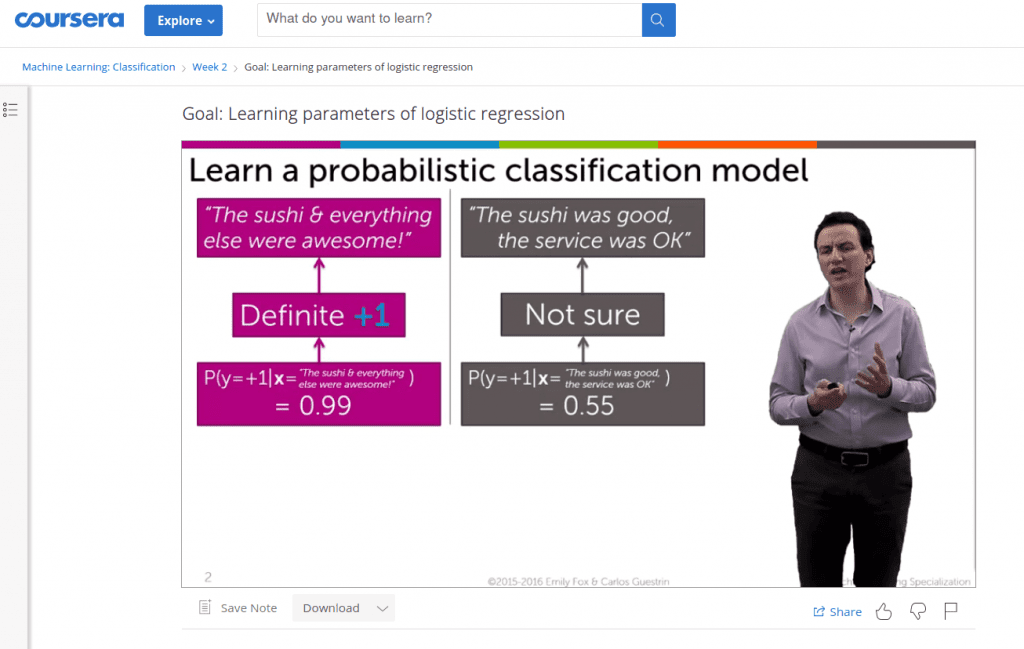
➡️ The Machine Learning Specialization is perhaps one of the best Coursera machine learning courses for intermediate machine learning students.
You’ll learn to analyze complex datasets, create systems and build applications that can make predictions from data.
Specialization Layout
There are 4 courses in the Machine Learning Specialization. And each of them uses a real-world case study approach:
✅ Machine Learning Foundations – Multiple
✅ Machine Learning: Regression – Predicting House Prices
✅ Machine Learning: Classification – Analyzing Sentiment & Loan Default Prediction
✅ Machine Learning: Clustering & Retrieval – Finding Similar Documents
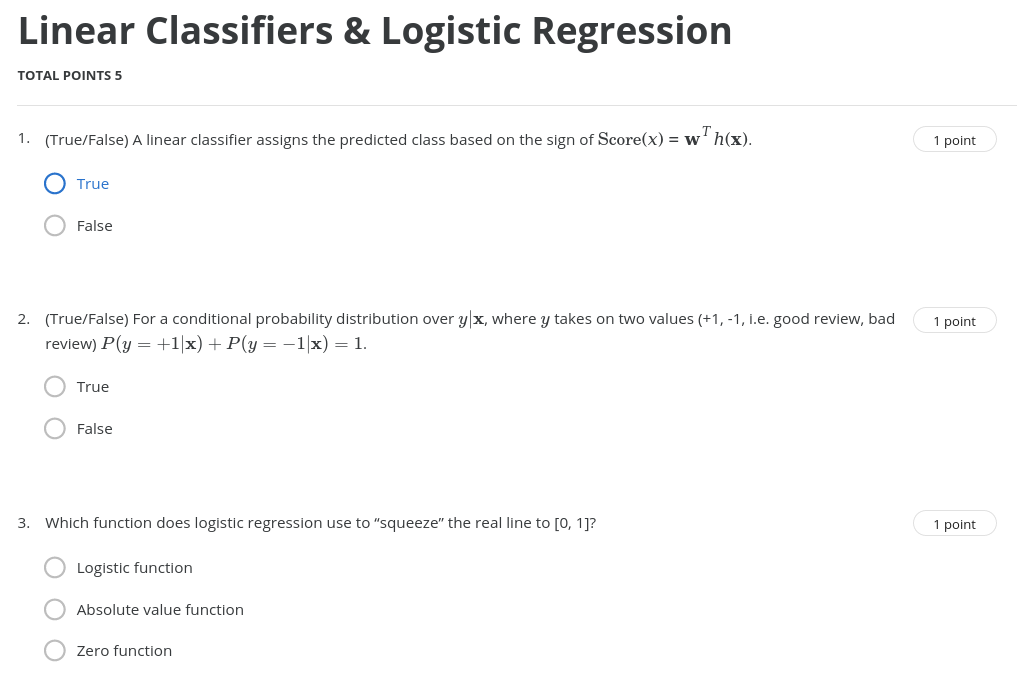
Projects
In this Coursera Machine Learning Specialization, you’ll implement predictive, classification and clustering machine learning algorithms. And you’ll use real datasets to do so.
Takeaway
You’ll walk away from this Specialization with experience in applied machine learning and Python programming.
Coursera Machine Learning Specialization for Advanced Students
No we’ll look at some of the most advanced Coursera machine learning courses.
🤝 Coursera Machine Learning Courses: Community and Support
Coursera has a robust community where you can ask questions, search for jobs, get a study buddy, and beyond.

🎖️ Coursera Machine Learning Courses: Certificate
There is a certificate for every completed Coursera machine learning course and Specialization.
💰 Coursera Machine Learning Courses: Cost
You can purchase Specializations for $49 per month.
But for $59 per month, you can access multiple Specializations and over 3000 courses.
📌 Note: These prices are subject to change. There are multiple pricing structures within the Coursera ecosystem.
For more information on Coursera pricing, check here.
Coursera Machine Learning Courses: Conclusion
Today we showed you some of the best Coursera machine learning courses and Specializations:
Beginner
✅ Machine Learning for All
✅ Mathematics for Machine Learning Specialization
Advanced Beginner
✅ Machine Learning with Andrew Ng
Intermediate
✅ Machine Learning with Python
✅ Machine Learning Specialization
So whether you’re a newbie, need to refresh your math skills, or are middle of the line, we’ve got something for almost every machine learning level.
Readers of Coursera Machine Learning Courses are also reading:
- 10 Best Machine Learning Books for Beginners
- 11 Best Python Machine Learning Books
- MLExpert Review: AlgoExpert’s New Machine Learning Course
- Best Machine Learning Courses for Beginners
- Is Grokking the Machine Learning Interview by Educative Worth It?
What are the best Coursera machine learning courses?
It all depends. If you’re new to machine learning, we think you’ll want to take a beginner course like Coursera’s Machine Learning for All. If you’re ready for something a little faster paced in the beginner-level range, check out Machine Learning by Andrew Ng. And if you’re ready for an intermediate course, Machine Learning with Python is one of the highest-rated courses on Coursera. Learn more about these and other Coursera machine learning courses in today’s post.
What’s the best Coursera machine learning Specialization?
If you need to brush up on your math skills, the beginner Coursera machine learning Specialization Mathematics for Machine Learning might be a good place to start. But if you have the foundations of machine learning down, the Machine Learning Specialization is intermediate level. And if you’re ready to hit the big time, sign up for the Advanced Machine Learning Specialization. It takes 10 months to complete. Learn more about these Specializations in today’s article.
Where can I find the Andrew Ng Stanford course on machine learning?
There is a beginner Coursera machine learning course by Andrew Ng called Machine Learning. This is a top-rated course with over 150,000 reviews to back up its stellar reputation. Whereas it’s listed as a beginner course, we recommend taking Machine Learning for All as a prerequisite. Learn more about this and other Coursera machine learning courses in today’s post.
What is machine learning?
Machine learning is a part of artificial intelligence where a machine has the ability to imitate human behavior. This includes image recognition, natural language processing, performing physical actions and beyond. The idea is that a computer can learn and adapt without humans. Learn more about machine learning’s capabilities in today’s post where we’re looking at the best Coursera machine learning courses for this year.
Where is machine learning used?
Machine learning is used in a variety of ways including speech recognition, email filtering, banking software, medical diagnosis, and beyond. Discover more features of machine learning in today’s post. We’re looking at the best Coursera machine learning courses we could find.
